|
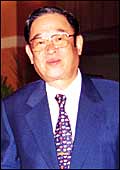 Early
this year when a reporter asked Fujio Cho about Toyota
Motor's plans to corner 15 per cent of the global car market,
the 68-year-old President said it was merely an employee-motivation
slogan that had leaked out of its car plants in Japan. Of course,
nobody believes that. Quietly but relentlessly, Toyota has risen
from being a maker of cheap little cars to an automotive behemoth
that now seems set to displace General Motors as the world's top
player. In India, which Toyota entered rather late with a breadbox
called Qualis, it has similar plans. And Cho, due to retire at
the end of this year, came to fire the first salvo with a snazzy
new SUV (sports utility vehicle), the Innova. Although his maiden
visit to the country was kept a secret till the very last minute,
Cho did oblige the media by holding a press conference. His message:
Toyota will garner 10 per cent of the Indian market by 2010 and
"the Innova is a step in that direction". Rivals, watch out. Early
this year when a reporter asked Fujio Cho about Toyota
Motor's plans to corner 15 per cent of the global car market,
the 68-year-old President said it was merely an employee-motivation
slogan that had leaked out of its car plants in Japan. Of course,
nobody believes that. Quietly but relentlessly, Toyota has risen
from being a maker of cheap little cars to an automotive behemoth
that now seems set to displace General Motors as the world's top
player. In India, which Toyota entered rather late with a breadbox
called Qualis, it has similar plans. And Cho, due to retire at
the end of this year, came to fire the first salvo with a snazzy
new SUV (sports utility vehicle), the Innova. Although his maiden
visit to the country was kept a secret till the very last minute,
Cho did oblige the media by holding a press conference. His message:
Toyota will garner 10 per cent of the Indian market by 2010 and
"the Innova is a step in that direction". Rivals, watch out.
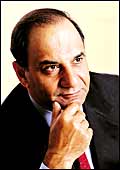 "Secessionist
CEO" "Secessionist
CEO"
Running
a large corporation is trouble enough for most CEOs, but not Farooq
Kathwari. Apart from managing US furnishings giant Ethan Allen,
Kathwari has taken it upon himself to find a resolution to the
intractable Kashmir issue. Why? For one, Kathwari, in India recently,
is a Kashmiri. He moved to the US in 1965 and went on to become
the owner of a brand as American as the apple pie. Also, he's
personally suffered because of global violence. His 19-year-old
son, Irfan, went to Afghanistan despite the family's protests
and was killed fighting the Russians alongside the Taliban. Says
Kathwari: "Global violence often hits the poor and the innocent
the worst." He's been labelled a secessionist for his efforts,
but Kathwari chooses not to let that stop him from finding peace
for his people.
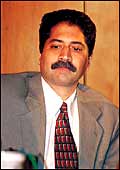 Old
Lady Fright Old
Lady Fright
Battle
lines are coming sharper into relief in Mumbai's newspaper market.
Tariq Ansari-owned Mid-Day Multimedia has sold a 10 per
cent stake to the Indian Express Group for Rs 25.54 crore. Is
that in response to a perceived threat from Bennett, Coleman &
Co. (owner of the Times of India-the Old Lady of Boribunder),
which has mopped up 8 per cent of Mid-Day's shares? "With 64 per
cent of the company controlled by my family, there is little danger
of a hostile acquisition," says Ansari. Then why strike the Express
deal at one-third the market price?
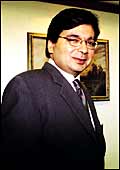 Second
Wind Second
Wind
Seven
years ago, when BZW shut shop in India, Alok Vajpeyi launched
his own advertising and publishing firm. The venture came a cropper
and Vajpeyi had to take up another job-at DSP Merrill Lynch in
Mumbai. A couple of months ago, he quit as the coo of DSP's mutual
funds business. Now we know why. It's that entrepreneurial itch
again. This time around, Vajpeyi, 44, has tied up with the UK-based
financial and property services group, Dawnay Day, to offer everything
from wealth management to corporate finance. "I want to build
a sustainable financial services group in five to seven years
from now," says Vajpeyi, a London School of Economics graduate.
Compared to advertising, this seems more up his street.
Power Surge
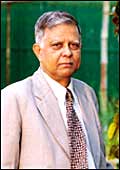 A
little over a month ahead of his retirement, National Hyderoelectric
Power Corp.'s (NHPC) boss Yogendra Prasad has been caught in the
maelstrom of a controversy. A Bharat Heavy Electricals Ltd. (BHEL)-Marubeni
consortium has accused NHPC of wrongly awarding a key contract
(Subansiri Project) to French engineering giant Alstom. "I have
done an honest assessment and given the contract on the basis
of the bid document," defends Prasad, 59, an electrical engineer,
who started his career at NHPC way back in 1978. But shouldn't
one PSU have preferred another PSU? "Alstom's bid was much lower
than that of the BHEL-Marubeni combine, even after all the necessary
corrections were made," says Prasad. When BT went to press, Prasad
seemed set to finalise the deal on March 11, leaving BHEL to lick
its wounds. A
little over a month ahead of his retirement, National Hyderoelectric
Power Corp.'s (NHPC) boss Yogendra Prasad has been caught in the
maelstrom of a controversy. A Bharat Heavy Electricals Ltd. (BHEL)-Marubeni
consortium has accused NHPC of wrongly awarding a key contract
(Subansiri Project) to French engineering giant Alstom. "I have
done an honest assessment and given the contract on the basis
of the bid document," defends Prasad, 59, an electrical engineer,
who started his career at NHPC way back in 1978. But shouldn't
one PSU have preferred another PSU? "Alstom's bid was much lower
than that of the BHEL-Marubeni combine, even after all the necessary
corrections were made," says Prasad. When BT went to press, Prasad
seemed set to finalise the deal on March 11, leaving BHEL to lick
its wounds.
-Contributed by Kushan Mitra, R.
Sridharan, Shailesh Dobhal, Roshni Jayakar and Ashish Gupta
|




 E
E "Secessionist
CEO"
"Secessionist
CEO" Old
Lady Fright
Old
Lady Fright Second
Wind
Second
Wind A
A